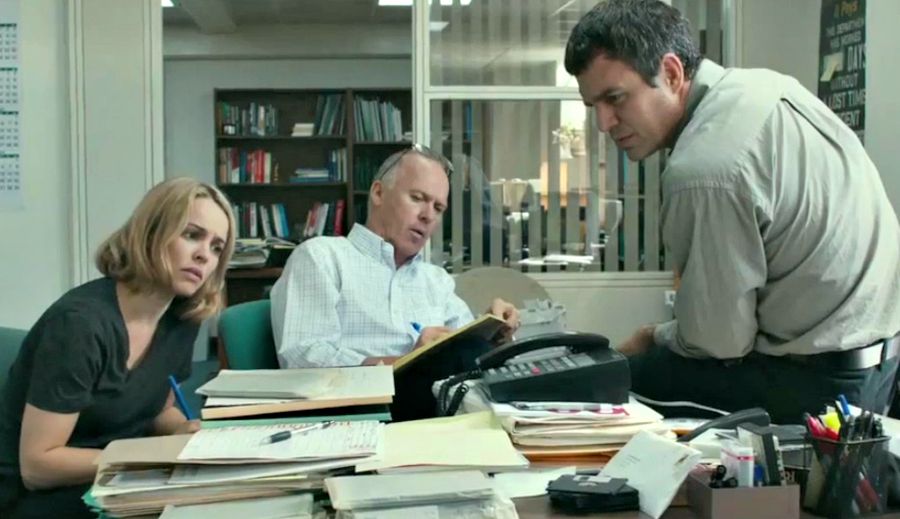‘If it takes a village to raise a child, it takes a village to abuse them’
Spotlight highlights the failure of God’s representatives to heed his call to care for those least capable of protecting themselves
Some films are so powerful, they’re hard to recommend to others to watch – The Pianist, Sleepers and even The Passion of the Christ spring to mind. But there are others that are both disturbing and engaging, often because of what they reveal about the human heart. Spotlight is just such a film.
Michael Keaton stars as Walter ‘Robby’ Robinson, the Boston Globe editor who led a 2001 investigation into Fr. John Geoghan. A Roman Catholic priest, Geoghan had numerous accusations of sex abuse levelled against him, yet was moved from parish to parish each time the problems were reported. As fellow reporters Michael Rezendes (Mark Ruffalo) and Sacha Pfeiffer (Rachel McAdams) pull at the threads of his story, they begin to realise the Boston Archdiocese had full knowledge of not only Geoghan’s crimes but those of a further 86 priests who had been abusing the innocent. What emerges is a film not so much about the molestation of children – Spotlight actually steers clear of delving into the lurid details – but the failure of God’s representatives to heed his call to care for those least capable of protecting themselves.
It’s hard to underestimate the international effect of the Boston Globe’s articles. Stories of priests who had interfered with children had been published for decades before, but this was the first investigation that revealed a branch of the church systematically ignoring sin on an alarming scale. Undoubtedly, those church leaders who failed to live up to their calling will have to give an account to their maker on the last day, but will they be the only ones?
This was the first investigation that revealed a branch of the church systematically ignoring sin on an alarming scale.
During their investigation the Spotlight team comes across a victims advocate called Phil Saviano. He assures them: “If it takes a village to raise a child, it takes a village to abuse them.”
The deeper they dig, the more police officers, lawyers, administrators, family members, and even other reporters they uncover who were aware of the problem but failed to do anything. Robby observes, “It seems everyone already knows the story except us.”
The film’s implication is that people remained silent not because they were unaware but because they didn’t want to risk becoming a social pariah. However, their self-preservation ended up shielding the abusers and perpetuating their crimes. Robby is particularly struck by his own guilt when he realises he’d been given the facts associated with their story eight years earlier. The only comfort his manager can offer him is our flawed ability to deliver justice:
“Sometimes it’s easy to forget that we spend most of our time stumbling around in the dark. Then someone turns a light on and there’s plenty of blame to go around.”
Some in Spotlight take this as an opportunity to point the finger at God, the god of justice. However, Christian viewers will see their Father in Heaven can also be numbered among its casualties. One bishop cautions a mother against reporting her son’s abuse by hiding behind the ‘body of Christ’ – “Now Sheila, you know what good work the church does in the community…” As a consequence it’s God’s name that is maligned when other characters express their loss of faith in his servants.
Finding fault with the church and rejecting God is as rational as suffering food poisoning and refusing to eat.
Mark Ruffalo’s character rightly denounces the church for its actions, but also makes an unsettling extension of the number of victims to include himself:
“I actually really loved going to church as a kid. I really thought that one day I’d go back and I was holding on to that. They took that from me.”
I’m sure the scriptwriters didn’t mean to place those who were outraged by the deceit of church leaders on equal footing with the children abused. However in a few lines Ruffalo’s character makes all of us victims, and provides a ready justification for anyone who chooses to reject God. Yet the truth is Ruffalo’s claim to potential Christianity is as unrealised as the action those who knew of the abuse told themselves they would one day take.
It’s easy to hide behind what we might have done if things had been different. However, finding fault with the church and rejecting God is as rational as suffering food poisoning and refusing to eat. No -one can accuse the Father of taking sin lightly; he promises to deliver unflinching, eternal judgment on those who refuse to repent. Neither can they suggest he lacks mercy; He sent his own son to suffer at our hands so that literally any sinner might be spared.
Spotlight is a sober warning of the power of the truth. However, we should be wary of sitting in judgment on those who have their sins revealed. The light that exposes them can too easily expose us as well.
Email This Story
Why not send this to a friend?


